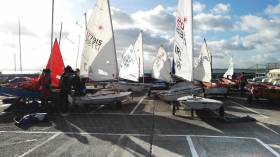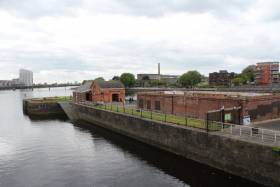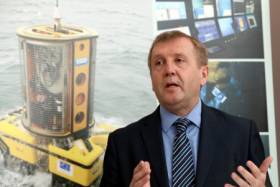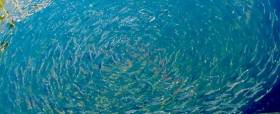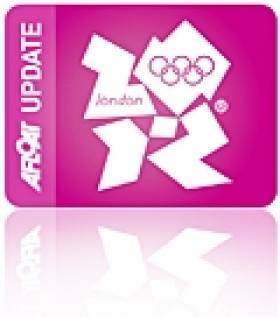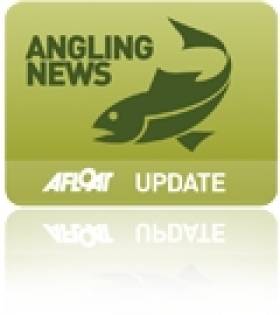Displaying items by tag: grants
Sutton, Royal Cork & Others Benefit From €37M In Grants To Sports Capital Projects
Sutton Dinghy Club received the biggest amount out of four local allocations for sailing as the 2018 round of the Sports Capital Programme is completed.
The north Co Dublin club was awarded €55,971 towards the upgrade of its clubhouse facilities and slipway, out of a total of €37 million for local projects announced last Friday (15 November) by the Department of Transport, Tourism and Sport (DTTAS).
Elsewhere, Royal Cork Yacht Club receives €38,051 towards its plans for new universal access to sailing at its marina, while Inniscarra Sailing and Kayaking Club was allocated €9,062 for sports equipment and improvement of facilities.
And Killaloe Sailing Club in Co Clare was granted €28,158 towards new facilities and a new club RIB.
There was also a single allocation for rowing, as Courtmacsherry Rowing Club was awarded €82,802 towards the first phase of its new clubhouse plans.
The Sports Capital Programme (SCP) is the primary means of providing Government funding for capital projects to sport and community organisations at local, regional and national level. According to the DTTAS, the 2018 round of the SCP saw the highest level of interest ever with 2,337 individual applications received.
New Round Of Funding For Corrected Sports Capital Programme Submissions
Four aquatic sports-related projects will share in the €7 million in grants announced under the Sports Capital Programme (SCP) for schemes previously deemed invalid in 2017 but since corrected.
In Cork, Lee Valley Rowing Club will receive €12,000 for the purchase of rowing boats and oars, while Fingal Rowing Club in north Co Dublin will get €23,000 under is boat and equipment application.
Equipment for junior sailing will get a grant of €18,500 towards its purchase at Dundalk & Carlingford Sailing Club in Co Louth, and Limerick Boat Club’s re-roofing project receives the biggest sum of his cohort of €37,400.
“The Sports Capital Programme remains an essential vehicle for providing suitable sports facilities and equipment to allow as many people participate in sport as possible,” said Sport Minister Shane Ross.
“The grants which we have approved [on Thursday 17 January] will benefit every county and 23 different sports will see improved facilities and equipment. I look forward to announcing grants to many more deserving sports projects later in the year.”
Minister of State Brendan Griffin added: “Since being appointed minister with responsibility for sport, I have had the pleasure of seeing the huge difference that the Sports Capital Programme has made throughout the country.
“I commend the volunteers behind the clubs and groups receiving grants today. They are the lifeblood of sports in Ireland and providing them with the right facilities and equipment is the least we can do to assist them in their roles as coaches, mentors or grounds keepers.”
Under the 2018 SCP, for the first time, applicants who were invalid under the previous round were invited to correct their applications rather than having to make completely fresh applications.
A total of 186 groups took up this opportunity and over 90% of these groups are now getting a grant.
The full list of grants is available on the DTTAS website, as is the list of successful corrected applications for 2018.
Minister Announces Funding For Marine Research Projects
#MarineScience - Marine Minister Michael Creed has announced the awarding of €3.3 million grant funding through the Marine Institute to research projects in specialist marine equipment and ocean law.
Some 19 funding grants in total have been made in the area of specialist marine equipment and small infrastructure, totalling more than €2.5 million.
The Higher Education Institutes (HEI) sector will receive 14 of these grants with five being granted to industry-led proposals (SMEs). The funding grants range from €20,000 to €200,000, with industry being funded at 75 per cent — meaning that these will also leverage private investment in specialist marine equipment for research and innovation development.
The ocean law and marine governance grant is being made to a partnership project between the MaREI Centre and University College of Cork School of Law. The funding amounts to €800,000 and will run over four years, employing three researchers with contributions from 12 MaREI and five UCC School of Law staff.
More than 20 researchers attended the announcement of the grants yesterday (Wednesday 22 November) in Dublin city centre.
“I’m delighted to announce these funding grants which herald the next step forward for many new projects in our marine sector,” said Minister Creed. “The funding for marine research equipment helps to target a gap in funding that exists between supports available to Higher Education Institutes via HEA and support from Ireland’s development agencies such as SFI and Enterprise Ireland.
“These grants will allow the marine research and innovation community to purchase specialist equipment needed to support their current and future research activities.”
Peter Heffernan, CEO of the Marine Institute, said the funding grants would enable pioneering marine research projects to develop in decades to come.
“The ocean law and marine governance grant marks a very important step in investing further in the area of marine law and governance,” he said.
“During the development of the National Marine Research and Innovation Strategy, it was indicated that this important research area should be supported and the Marine Institute, Department of Agriculture, Food and the Marine and the Department of Foreign Affairs were consulted and a call was launched for a project-based funding grant.
“We are delighted that the MaREI Centre and UCC School of Law will be collaborating on this project which is called Navigate and will be led and co-ordinated by Dr Anne Marie O’Hagan, a senior post-doctoral research fellow in the Marine and Coastal Governance Group in the MaREI Centre.”
Heritage In The Community Grant Scheme 2018 Now Open For Waterways Projects
#InlandWaters - In support of the Waterways Ireland Heritage Plan 2016-2020, the Heritage in the Community Grants Scheme for 2018 is now open for applications.
A fund of €20,000 has been allocated to assist community-based heritage projects which compliment or fulfil the delivery of the Waterways Ireland Heritage Plan along the Barrow Navigation, Erne System, Grand Canal, Lower Bann, Royal Canal, Shannon, Shannon-Erne and the Ulster Canal (Upper Lough Erne to Clones).
Applications will be considered from communities seeking assistance for projects related to inland waterways heritage, including data collection and research; good heritage practice in managing sites, collections, objects and more; and supporting fresh approaches and initiatives that link heritage to communities, promoting active engagement.
The deadline for receipt of completed applications, by email or post, is Wednesday 31 January 2018. Further details on the Heritage Grant Scheme are available on the Waterways Ireland website.
#Seafood - Marine Minister Michael Creed has announced the award of a further €1,324,040 in grants to 19 seafood enterprises in nine different counties under the European Maritime and Fisheries Fund (EMFF) Operational Programme for the seafood sector.
The grant awards will support total investment of €3.5 million in 2017. The grants are co-funded by the Exchequer and EU and subject to terms and conditions.
Minister Creed said: “In March, I announced EMFF grant awards of €1.8 million to seafood enterprises. I am delighted to now announce a further €1.3 million in EMFF grant awards to 19 seafood enterprises.
“It is especially welcome to see that aquaculture enterprises are dominating this round of grant awards. Grants of almost €1 million are being offered to 10 aquaculture enterprises. Nine of these will further develop our oyster production, while the other concerns mussels.
Taken together with the earlier awards in March, this means grant offers of nearly €2 million have already been made this year to 18 aquaculture enterprises and are supporting €5 million in aquaculture capital investments.
The minister added that the EMFF Sustainable Aquaculture Scheme “remains opens for applications and I am optimistic that we will see yet more aquaculture projects coming forward as the year progresses.
“The Sustainable Aquaculture Scheme supports capital investments in licensed aquaculture sites to grow our production and mitigate environmental impact. Our National Strategic Plan for Sustainable Aquaculture Development is aiming to sustainably grow our production by 45,000 tonnes and these 2017 projects are welcome contributions towards that target.”
Grant approvals - Sustainable Aquaculture Scheme
|
Beneficiary |
County |
Total Investment |
Grant Approved |
|
Sofi Shellfish Ltd |
Mayo |
€68,815 |
€27,526* |
|
Caragh Clams Ltd |
Kerry |
€27,354 |
€10,941 |
|
Donegal Oysters Ltd |
Donegal |
€610,880 |
€244,352 |
|
Donegal Ocean Deep Oysters Ltd |
Donegal |
€809,553 |
€323,821 |
|
Iasc Sliogagh Dún Garbhain Teoranta |
Waterford |
€342,176 |
€186,870 |
|
Racoo Shellfish |
Donegal |
€119,700 |
€47,880 |
|
Coney Island Shellfish Ltd |
Sligo |
€93,300 |
€37,320 |
|
Turkhead Enterprises Ltd |
Cork |
€51,317 |
€20,527 |
|
Eoin Carter |
Sligo |
€84,052 |
€42,026 |
|
Ostre’an Teoranta |
Donegal |
€62,837 |
€25,135* |
|
TOTAL |
|
€2,269,984 |
€966,398 |
* Subject to confirmation of SME status
Grant approvals - Seafood Processing Capital Investment Scheme
|
Beneficiary |
County |
Total Investment |
Grant Approved |
|
Good Fish Processing Ltd |
Cork |
€505,000 |
€113,250 |
|
Keohane Seafoods Ltd |
Cork |
€211,948 |
€57,819 |
|
Carr & Sons Seafood Ltd |
Mayo |
€235,076 |
€64,446* |
|
TOTAL |
|
€952,024 |
€235,515 |
* Subject to confirmation of SME status
Grant approvals - Seafood Scaling & New Market Development Scheme
|
Beneficiary |
County |
Total Investment |
Grant Approved |
|
Jade Ireland Seafood Ltd |
Dublin, Donegal, Cork |
€120,000 |
€60,000 |
|
TOTAL |
|
€120,000 |
€60,000 |
Grant approvals - Seafood Innovation & Business Planning Scheme
|
Beneficiary |
County |
Total Investment |
Grant Approved |
|
Ocean Run Ltd |
Cork |
€6,650 |
€3,325 |
|
Biomarine Ingredients Ireland Ltd |
Donegal |
€40,000 |
€20,000 |
|
Shellfish De La Mer Ltd |
Cork |
€39,604 |
€19,802 |
|
Rene Cusack Ltd |
Limerick |
€10,000 |
€5,000 |
|
Goatsbridge Fish Processors Ltd |
Kilkenny |
€28,000 |
€14,000 |
|
TOTAL |
|
€124,254 |
€62,127 |
Grants for Irish Rowers Who Excel on Ergometer
#Rowing: Ireland’s high performance director, Morten Espersen has announced that four grants will be available to rowers who produce exceptional performances on ergometers (rowing machines). The grants, of €5,000, will be for world class times on Concept 2. The performances needed are: Men, Open 5 minutes 35 seconds; Men, Lightweight 5:54. Women, Open 6:23; Women, Lightweight 6:53.
There will also be four travel scholarships for taking part in the ‘Crash Bs’ in Boston in February, for those who have achieved outstanding performance(s) at Irish Indoor Rowing Championships in Limerick. The evaluation panel will consist of Espersen, Joe Cantillon, the organiser of the Irish Indoor Championships and Alex Dunne of Concept 2.
Terms and Conditions:
Athletes must have full Rowing Ireland registration and be part of an affiliated Irish Club under Rowing Ireland.
The process is part of the Rowing Ireland on water trial process in 2016/2017.
Four Scholarships to be contested in Limerick (Irish Indoor Championships).
World Class times to be done at Limerick Irish Indoor Championship, Crash B or by appointment with HPD at NRC after Indoors.
Open window for World Class times: 20th October 2016 to 1st April 2017
If more than four athletes achieve the World Class times, the 4 best are picked with per centage list times to be achieved.
The Performance Strategy applies fully as weight management for lightweights
Only certified Concept 2 ergometers by HPD
HPD reserves the right to make all final decisions.
Sailing, Paddling, Diving Clubs & More Share In Latest Sport Capital Programme Allocation
#SportsCapital - Sailing, paddling and diving clubs across 20 counties will share in the latest €35 million allocation to local projects under the Sports Capital Programme.
Among the biggest beneficiaries under the latest grants are Cullaun Sailing Club in Co Clare, which receives €105,000; Cork's Phoenix Kayak Club and Skibbereen Rowing Club, getting €120,000 and €100,000 respectively; Waterford Harbour Sailing Club's €75,000 grant; and €80,000 for Wexford Harbour Boat and Tennis Club.
Dublin and Cork counties also boast the largest share of individual allocations, with 17 and 15 respectively.
Speaking at yesterday's launch, Minister for Sport Michael Ring said: "The Sports Capital Programme ensures that as many clubs and organisations as possible have the facilities and equipment they need to allow the maximum number of people to get involved in a wide variety of sports...
"By investing in community facilities, these grants take the pressure off clubs and groups to fundraise themselves to provide for the upgrading and building of premises and allows coaches and other volunteers to concentrate on growing the sports they know and love."
Recipient clubs and organisations related to sailing, boating, canoeing and kayking, angling, diving and other marine and river activities are listed below:
Co Clare
Cullaun Sailing Club €105,000
Killaloe Sailing Club €4,000
Co Cork
Ardfield Rathbarry Galleyflash Rowing Club €10,000
Bantry Bay Sailing Club €9,000
Cork Boat Club €34,000
Cove Sailing Club €10,000
Cork Sub Aqua Club €40,000
Glandore Harbour Yacht Club €8,000
Kilmacsimon Swimming & Rowing Club €3,500
Kinsale Yacht Club €13,000
Monkstown Bay Sailing Club €18,000
Phoenix Kayak Club €120,000
Royal Cork Yacht Club €43,000
Rushbrooke Rowing Club €7,000
Shandon Boat Club €18,000
Skibbereen Rowing Club €100,000
Sunday's Well Boating and Tennis Club €13,000
West Cork Kayaking Club €12,000
Whitegate Yawl Rowing & Swimming Club €7,000
Co Donegal
Irish Water Safety Donegal Surf Lifesaving Club €15,000
Co Dublin
12th Port Sandycove Canoeing Club €18,842
5th Port Dollymount Seac Scouts €14,000
Curragh Sub Aqua Club €21,643
Dalkey Scubadivers €55,420
Dun Laoghaire Motor Yacht Club €22,475
Howth Sea Angling Club €21,250
Neptune Rowing Club €10,625
Rush Sailing Club €60,750
Sailing in Dublin Club €7,000
Skerries Sailing Club €6,080
St Michael's Rowing Club, Dun Laoghaire €22,625
Sutton Dinghy Club €24,950
National Yacht Club €39,887
Royal St George Yacht Club €67,763
Viking Sub Aqua club €6,665
Co Galway
Clifden Boat CLub €24,000
Friends of St Josephs Rowing Club €10,000
Galway Bay Sailing Club Ltd €42,000
Galway Kayak Club €18,000
Tribesmen Rowing Club €31,045
Co Kerry
Fossa Rowing Club €15,000
Kerry Canoe Club - Killorglin €18,000
Portmagee Rowing Club €12,000
Co Kildare
Kilcullen Canoe Club €18,243
Co Laois
Laois Kayak and Canoe Club €8,000
Woodenbridge Paddlers Association €5,000
Co Limerick
Limerick and District Anglers Association €20,000
Limerick Sub Aqua Dive Club €13,000
Co Longford
Abbeyshrule Canoe Club €8,000
Lough Ree Sub Aqua Search and Rescue Unit €10,000
Co Louth
Co Louth Committee Irish Water Safety €7,000
Drogheda Sub Aqua Club €28,000
Co Mayo
Bellacragher Bay Boat Club €15,000
Grainne Uaile Sub Aqua Club €40,000
Co Meath
Omega Sub Aqua Club €16,000
Ribbontail Paddlers Canoe Club €5,000
Trim Canoe Club €6,000
Co Offaly
Shannonside Sub Aqua Club €29,000
Tullamore Canoe Club €3,000
Co Sligo
Sligo Rowing Club €10,000
Co Tipperary
Cahir Rowing Club €22,000
Clonmel Rowing Club €57,000
Lough Derg Sub Aqua Club €13,000
Co Waterford
Cappoquin Salmon & Trout Anglers Association €10,000
Waterford Boat Club €20,832
Waterford Harbour Sailing Club €75,000
Co Westmeath
Athlone Boat Club €15,000
Lough Ree Yacht Club €20,000
Co Wexford
New Ross Boat Club €60,000
Wexford Harbour Boat and Tennis Club €80,000
Wexford Sub Aqua Club €6,000
Co Wicklow
Arklow Rowing Club €24,750
Bray Rowing Club €5,223
Bray Sailing Club €5,921
Greystones Sailing Club €20,669
The full list is available as a PDF to read or download HERE.
The announcement comes as the Federation of Irish Sport releases its manifesto for Ireland to deliver on its sporting potential, which includes a restoration of sport funding to pre-2008 levels.
'Podium Athletes' Face Funding Cuts in 2013
#OLYMPICS - Yesterday Ireland's Olympic hopefuls celebrated recognition of their success in the 2012 round of funding.
But cuts to the budget of the Irish Sports Council (ISC) have prompted a "major" review of high performance programmes from 2013 onwards, the Irish Independent reports.
Finbarr Kirwan, director of high performance at the ISC, said: "Changes are coming, things are tight and we will have to make strategic cuts in the next two years."
The result could be fewer grant awards of lesser value for athletes, as Olympic qualification standards are set to get tougher from here on out.
The two tiers below 'podium class' - in which individuals receive awards of €20,000 and €12,000 respectively - are expected to be hardest hit in the review.
As previously reported on Afloat.ie, canoeing's Eoin Rheinisch, swimmer Grainne Murphy and sailors Annalise Murphy, Peter O'Leary and David Burrows each received the top level of funding of €40,000 each, which is on a par with last year's support.
The Irish Independent has more on the story HERE.
Life Choked Out of North Dublin Fishing Pond
#ANGLING - The public fishing pond at Darndale is "crying out for help" after an infestation of curly weed, The Irish Times reports.
A public meeting to discuss the issue recently heard that the invasive plant has spread throughout the entire pond, making casting all but impossible.
“We have a catchment of some 3,000 youngsters and adults who are deprived of fishing in their locality," said Brian Conneely of Sphere 17 Youth Service. "It’s a sad state of affairs.”
The meeting also heard of a possible solution to the problem, with Dr Joe Caffrey of Inland Fisheries Ireland suggesting a covering of jute or sacking to kill off the weed and allow the growth of native plants - a plan that appears to be working in Lough Corrib.
Costing is the issue, however, with such a jute priced at around €5,000. Maryann Harris of Dublin City Council's parks division said she was exploring grants to fund the project.
The Irish Times has more on the story HERE.


























